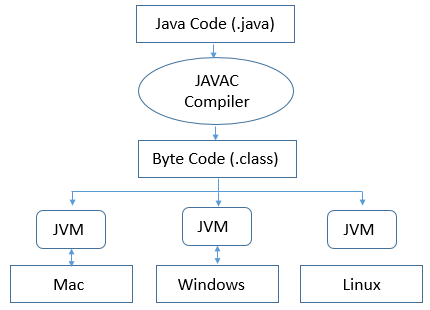How is the Java platform independent ?
Java's platform independence is a standout feature, enabling developers to write code that can be executed seamlessly on various operating systems. This is made possible by the Java Virtual Machine (JVM), a highly reliable and widely used virtual machine that ensures uniform execution across different platforms, adhering to the fundamental concept of "Write Once, Run Anywhere." This platform-neutral approach empowers developers to create versatile and portable applications, reducing deployment complexities and increasing the accessibility of Java-based solutions.
How is Java Platform Independent?
Java achieves platform independence through a combination of language design, bytecode compilation, and the Java Virtual Machine (JVM). Let's dive into the details of how and why Java is platform-independent:
Bytecode Compilation
When you write Java code, you first create a source code file with a .java extension. This Java source code is then compiled by the Java compiler (javac) into an intermediate form called bytecode. Bytecode is a low-level representation of the Java program, which is not tied to any specific hardware or operating system.
Java Virtual Machine (JVM)
The JVM is an integral part of the Java platform. It is responsible for executing Java bytecode on different platforms. The JVM acts as a runtime engine that interprets the bytecode and translates it into machine code for the underlying system. The JVM is specific to each operating system and provides a layer of abstraction between the Java code and the host system.
Platform-Neutral Syntax
Java is designed to have a platform-neutral syntax, meaning the language avoids using features that are specific to a particular operating system. This includes things like file paths, end-of-line characters, and byte order. Java uses a uniform set of rules for these features, ensuring that code behaves consistently across different platforms.
Standard Libraries
Java comes with a comprehensive standard library that provides a consistent set of APIs for common tasks such as I/O, networking, threading, and GUI development. These standard libraries abstract away platform-specific details, allowing developers to write code that can run on any system with a compatible JVM.

Why Java is Platform Independent?
Write Once, Run Anywhere (WORA)
Java's platform independence allows developers to write code once and run it on any platform that has a JVM. This eliminates the need for recompilation or modification of the code for different operating systems, saving time and effort in software development.
Cross-Platform Compatibility
With Java, developers can build applications that are compatible with various operating systems, including Windows, macOS, Linux, and others. This cross-platform compatibility makes Java suitable for a wide range of applications, from desktop software to mobile apps and web applications.
Reduced Deployment Complexity
Java's platform independence simplifies the deployment process. Once a Java application is developed, it can be distributed as a single bytecode file without worrying about the underlying system details of the end-users.
Increased Reach and Accessibility
Java's platform independence makes it accessible to a larger audience of users, as it can be executed on a diverse set of devices and operating systems. This has contributed to Java's widespread adoption and popularity in the software development community.
Conclusion
Java's platform independence is achieved by compiling source code into platform-neutral bytecode and executing it on the Java Virtual Machine, which provides an abstraction layer between the code and the underlying system. This approach allows Java to be a versatile and widely used programming language, enabling developers to create applications that run seamlessly across different platforms.